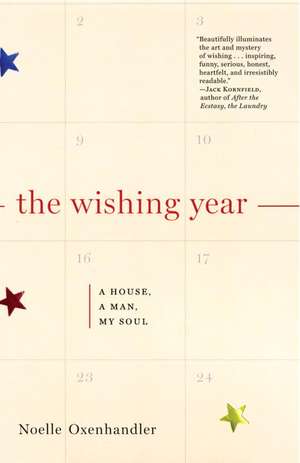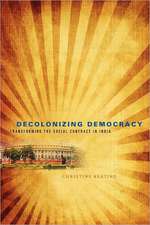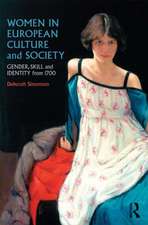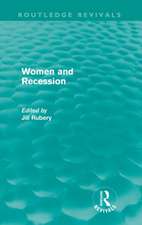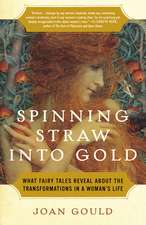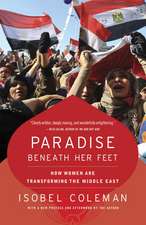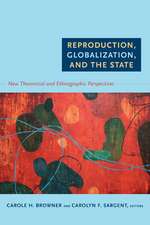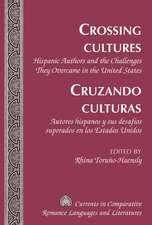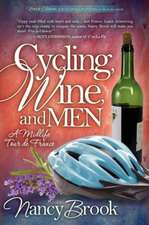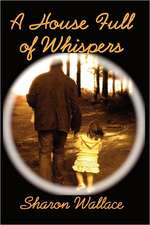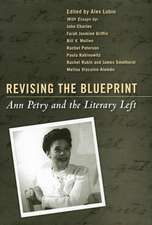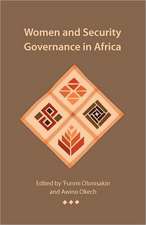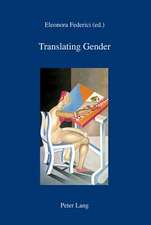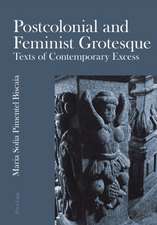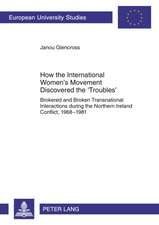The Wishing Year: A House, a Man, My Soul; A Memoir of Fulfilled Desire
Autor Noelle Oxenhandleren Limba Engleză Paperback – 30 iun 2009
In this charming, compelling, and ultimately joyful book, Oxenhandler records a journey that is at once comic and poignant, light and dark, earthy and spiritual. Above all, she is amazed to find that there is, indeed, both power and danger in the act of wishing. For soon her wishes begin to come true–in ways that meet, subvert, and overflow her expectations. And what started as a year’s dare turns into a way of life.
Preț: 104.17 lei
Nou
Puncte Express: 156
Preț estimativ în valută:
19.93€ • 20.81$ • 16.50£
19.93€ • 20.81$ • 16.50£
Carte disponibilă
Livrare economică 15-29 martie
Preluare comenzi: 021 569.72.76
Specificații
ISBN-13: 9780812975505
ISBN-10: 0812975502
Pagini: 294
Dimensiuni: 93 x 235 x 18 mm
Greutate: 0.22 kg
Editura: Random House Trade
ISBN-10: 0812975502
Pagini: 294
Dimensiuni: 93 x 235 x 18 mm
Greutate: 0.22 kg
Editura: Random House Trade
Notă biografică
Noelle Oxenhandler is the author of two previous nonfiction books, A Grief Out of Season and The Eros of Parenthood. Her essays have appeared in many national and literary magazines, including The New Yorker, The New York Times Magazine, San Francisco Chronicle Magazine, Vogue, Tricycle, Parabola, Utne Reader, and O: The Oprah Magazine. She has taught in the graduate writing program at Sarah Lawrence College and is a member of the creative writing faculty at Sonoma State University in California. A practicing Buddhist for more than thirty years, Oxenhandler is the mother of a grown daughter and lives in Northern California.
From the Hardcover edition.
From the Hardcover edition.
Extras
Chapter One
January
Shrines: Honoring Desire
It’s New Year’s Day: bright and cold, with wind moving through the tops of the eucalyptus trees and silver clouds gathering in the distance. Beside me on the table are the remains of last night’s rather quiet celebration: in a glass bowl, four walnut sailboats float on water, their mission accomplished. Bobbing in a small sea of varying good fortunes, each made its way to one particular rolled-up paper message, tied with a gold ribbon. Mine read: “This year you will make a remarkable voyage to a place you’ve never been.”
Hawaii?
Whenever I encounter the word voyage, the word Hawaii springs up like a flower. For as long as I can remember, it’s been my wish place, a place in whose actual existence I’ve never fully believed. I’ve looked through travel books, gazed at other people’s photographs, and tried to imagine myself actually there among its iridescent green valleys, its waterfalls and lava beds, its banks of plumeria, hibiscus, and bromeliad. Yet Hawaii has always seemed out of reach to me, a place for which I lacked some crucial piece of paper, a ticket or permit saying, “Let her pass.”
In any case, I already sense that the fortune I’ve drawn is about a different kind of voyage—not so much to a place as to a different state of mind.
Fortunes, oracles, signs, and omens: don’t they belong to the same family as the wish? They all spring from that great human need to gain some purchase on the future—if not actually to alter its course, then at least to see into its shape, discern its contours, its pattern of light and dark.
When I look up the word wish in the dictionary, here’s what I find: it comes from the Middle English wen, and is related to the Latin venus as well as venom (originally a kind of love potion) and to venereal (referring to love disease), along with venison (containing a link to hunting).
Already, in that one small word, so much is gathered: desire, danger, seeking. It seems in itself a kind of omen for the “remarkable voyage” I’m about to embark on. But let me begin by laying my cards on the table, alongside the glass bowl with its four walnut boats.
Like most people I know, I have a long list of wishes for the world around me. However, when it comes to things on the cosmic scale— things as immense and complex as ending war, hunger, poverty, disease, and the destruction of the natural environment—I don’t yet have much faith in the power of wishing. Perhaps such faith will emerge as I move forward, but for now I need to focus on a smaller scale. Using my own life as a petri dish, I’m going to start with the two wishes at the top of my personal list.
One is to be spiritually healed. The second is to buy a house.
Is it crazy, a kind of blasphemy even, to set these two cards alongside each other, as though they belong to the same deck?
Not long ago, while I was slumped on the sofa late at night, I happened to catch a popular TV evangelist who was dressed to the nines with big hair, major earrings, and bright makeup. “I’m expecting radical favor!” she beamed, raising her bejeweled hands toward God in His heaven. “I’m expecting favor, blessings, and the best cut of meat in the house!” Her audience beamed back from their stadium seats, as though God, at that very moment, was processing their order for prime rib.
Where does such chutzpah come from? I wondered. When I was young I was taught not to engage in petitionary prayer. Or rather, I was taught that it was all right to petition God for things of the spirit, but not for things of the world. Ask and ye shall receive, I was taught. But it was understood that what ye asked for was grace, peace, forgiveness—not jewels on your fingers or Angus beef.
Of course, you might pray for someone who was ill to be healed, for someone who’d lost his job to find employment, for a family whose house had burned to find shelter—but such specific requests for divine intervention in earthly affairs were reserved for dire occasions, for situations of acute suffering and drastic need. Though God was omnipotent and omniscient, the source of time and the end of time, He didn’t have time to fritter away. He had to focus on matters of supreme importance—sustaining the universe from moment to moment, forgiving sins, granting life everlasting. You didn’t badger Him for lesser favors, and you trusted Him to take care of your deepest needs.
A few nights ago I was invited to join a gathering of women in a beautiful house in Sausalito, which is just south of where I live. They ranged in age from thirty to sixty-something, and among them were therapists, artists, writers, musicians, entrepreneurs. They were an impressive group: highly educated, well traveled, creative, accomplished, and spiritually oriented. Though most of them had never met me before, they were gracious and welcoming. And yet as the evening wore on, I began to feel very estranged. After dinner our hostess lit the logs in the fireplace and asked us to gather in the living room. Flopped on the sofa, chairs, and pillows in front of the fire, we were invited to share our wishes for the coming New Year. One by one, around the circle, each woman spoke—and as the ritual went on, I felt more and more uncomfortable.
“I wish for world peace,” the first woman said. Then, after only a slight pause, she continued, “I want to develop a new product line. And I want to lose weight.” The next woman began, “I wish to become more forgiving. I wish for a boyfriend. And new client referrals.” And so it went around the circle until it was my turn—and I could barely speak. I stammered something vague and abstract about “seeking more balance in my life,” and then—when they went out to the garden to light candles—I slinked away in the dark.
Driving home, I tried to figure out what was the matter with me, why I had fled from a group of kind and intelligent women who were openly and sincerely articulating their desires. That’s when I realized: I’m a terrible wish snob. It’s not that I mean to be. It’s that somehow I grew up with a powerful wish hierarchy in place. Under this regime, it’s okay to wish openly for compassion or world peace. It’s okay, if someone asks you what you want for your birthday, to say you want a sweater or a bracelet. It’s okay, if you’re having a conversation with your friends, to say you want to find a lover or switch careers or lose ten pounds. But in a ceremonial setting, to openly declare certain desires for personal happiness, and to set them alongside more universal and spiritual goals as if they were all simply part of a continuum: that’s taboo.
Recently, while reading a magazine, I came across a letter that John F. Kennedy received from his mother during the last year of his life. “Dear Jack,” she wrote, “In looking over my old diary, I found that you were urged on one occasion, when you were five years old, to wish for a happy death. But you turned down this suggestion and said that you would like to wish for two dogs instead.”
Clearly, the little boy hadn’t yet grasped the hierarchy of wishes, and that’s partly what makes the story comic. It presupposes a certain spiritual framework, one in which adults do not merge the categories because to do so is actually a serious matter, a metaphysical breach. And indeed when I dare to say in the same breath, “I want to be spiritually healed and I want to buy a house,” I feel a visceral dread, a sinking in my gut, and an impulse to run for cover like a scared rabbit in an open field. It’s the feeling that something out there in the universe, some form of the powers that be, is going to swoop down and do me in.
But heck: here I am, living in northern California, the land of Putting It Out There. Which is to say, the land of unabashed articulation of desire, a place where one out of every three people subscribes to the belief that—so long as what we want does not cause harm to others—the universe wants us to be happy. And if only we will take the time (1) to discover what it is we really want, (2) to focus and articulate this desire, and (3) to remove the obstacles that arise in the form of certain negative thoughts and habitual behaviors— the universe will cooperate with us to bring about our goals.
When I returned to California thirteen years ago, the move was not just a huge geographical shift. I was also trying to shed a way of life that was the opposite of Putting It Out There—a way of life that might have been called Warding It Off or even Making It Hard. Why is it that some of us seem drawn to hardship as if it’s a magnet, entranced by the uphill road? Isn’t our behavior counterrevolutionary, unadaptive, like fish trying to swim without fins or birds clipping their own wings?
Of mixed Jewish and Catholic heritage, I grew up with an alertness to suffering and a fear of disproportionate earthly happiness that seemed equally reinforced by both traditions.
Consider the Jewish custom of breaking a glass at a wedding. Many people believe that it symbolizes the breaking of the bride’s hymen, but some scholars tell a different story. In a village in medieval Poland, a distinguished rabbi came upon a wildly exuberant wedding party. Amid the laughter, the feasting and dancing, the rabbi grew anxious. The joy was so intense and uncontained that it was bound to catalyze misfortune. The solution? Break a glass, in order to restore a proper sense of measure. Create a small disaster, in order to stave off the looming presence of a big one.
That solution makes perfect sense to me. It’s a kind of mathematics of existence, a chemical equation: too much undiluted happiness will seed the clouds. When you’ve been a tribe apart for thousands of years, the stakes are huge. Who knows when your little oasis of happiness will be destroyed again, bringing you endless wanderings, slavery, pogroms, cattle trains? You must remember these things, even when you rejoice. At the Passover feast each spring, when you eat the egg that symbolizes your tribe’s new life, you must taste it along with a sprig of bitter herbs, dunked in a bowl of saltwater tears.
At the same time that I was absorbing the long history of Jewish suffering, I was encountering the image of Jesus dragging his heavy cross, the saints and martyrs enduring fire and flagellation, sleeping on nails and consorting with lepers. Baptized a Catholic, when I was confirmed at age thirteen I chose the name Bernadette, in honor of the little wood-gathering saint who encountered the Virgin Mary not far from the French village of Lourdes. I’d come across her photograph once, and it had moved me. Circa 1852, it showed a frail young girl bent under a giant mound of sticks.
Then there was my grandmother Grace, who lived a few blocks away from us in Santa Monica and whom I often visited in her small apartment. With her snow-white hair and fine manners, her violets and embroidery and paper-thin cookies, she seemed the quintessence of old-lady sweetness—but I knew that she carried inside her a secret core of fierceness. As a young girl she had been lovely, with sapphire-blue eyes and a cloud of brown hair. She had grown up in a big house in Chicago in the 1880s, in the sort of neighborhood where people thwacked croquet balls on summer lawns and gathered around the piano on chilly nights, dressed in yards of starched and pleated clothing. She had elegant suitors.
Yet as a young woman she had left it all behind to become a social worker among the coal miners of Alabama. “Tell me the Friday-night story!” I used to beg her, because it thrilled me to think of my dainty grandmother living dangerously. And she would tell me how on Friday nights when the miners got paid they would go to the bar in town and get drunk and rowdy. She’d be in her room in her long white nightgown, in her stocking feet and with her hair brushed loose, and she would hear them on their way home, singing and shouting and breaking bottles. Then she would come to my favorite part of the story: I’d drag my dresser to block my door, so the men couldn’t break into my room.
The Jews dragging their tents through the desert. Jesus dragging his cross. Bernadette dragging her load of sticks. My grandmother dragging her dresser. Somehow I grew up believing that the recipe for an authentic life was Drag something heavy. Later on, when I learned the Buddhist expression “Whatever walks in the family gate is not the true treasure,” it hit home for me. Always suspicious of anything that seemed to come too easily, I’m quite sure that if I’d been born with a silver spoon in my mouth, I would have tried to yank it out.
And though I wasn’t born with a silver spoon, there were other shiny things that came to me early in life, as if handed on a platter. One of them was California, where I grew up in nearly perpetual sunshine by the ocean: first in southern and then in northern California. Somewhere along the way I internalized the attitude of much of the rest of the world that life in California—despite the always imminent threat of earthquake, flood, and fire—is too easy and therefore unreal. And so as soon as I was old enough to leave home, I moved to the realest place I could find. I moved across the country to another universe: flat, cold, and incessantly gray. The college I’d chosen was south of Lake Erie in Ohio, and in May, toward the end of my first school year, I was sitting at my desk when I became aware of a strange sensation in my eyes. I rubbed vigorously, attempting to remove the foreign object, and then I realized: the foreign object was sunlight. I put my head on my desk and sobbed.
Yet, true to form, I stayed in that gray zone for another two decades. From Ohio I moved to Toronto for graduate school in philosophy. Then, having discovered Zen Buddhism, I moved directly south of Lake Ontario to study at the Rochester Zen Center, deep in the snow belt of New York. In that part of the world, the sky is gray for nearly three hundred days a year—and not a mobile, light-infused gray, but a dense gray in which there is not the least glimmer of light.
January
Shrines: Honoring Desire
It’s New Year’s Day: bright and cold, with wind moving through the tops of the eucalyptus trees and silver clouds gathering in the distance. Beside me on the table are the remains of last night’s rather quiet celebration: in a glass bowl, four walnut sailboats float on water, their mission accomplished. Bobbing in a small sea of varying good fortunes, each made its way to one particular rolled-up paper message, tied with a gold ribbon. Mine read: “This year you will make a remarkable voyage to a place you’ve never been.”
Hawaii?
Whenever I encounter the word voyage, the word Hawaii springs up like a flower. For as long as I can remember, it’s been my wish place, a place in whose actual existence I’ve never fully believed. I’ve looked through travel books, gazed at other people’s photographs, and tried to imagine myself actually there among its iridescent green valleys, its waterfalls and lava beds, its banks of plumeria, hibiscus, and bromeliad. Yet Hawaii has always seemed out of reach to me, a place for which I lacked some crucial piece of paper, a ticket or permit saying, “Let her pass.”
In any case, I already sense that the fortune I’ve drawn is about a different kind of voyage—not so much to a place as to a different state of mind.
Fortunes, oracles, signs, and omens: don’t they belong to the same family as the wish? They all spring from that great human need to gain some purchase on the future—if not actually to alter its course, then at least to see into its shape, discern its contours, its pattern of light and dark.
When I look up the word wish in the dictionary, here’s what I find: it comes from the Middle English wen, and is related to the Latin venus as well as venom (originally a kind of love potion) and to venereal (referring to love disease), along with venison (containing a link to hunting).
Already, in that one small word, so much is gathered: desire, danger, seeking. It seems in itself a kind of omen for the “remarkable voyage” I’m about to embark on. But let me begin by laying my cards on the table, alongside the glass bowl with its four walnut boats.
Like most people I know, I have a long list of wishes for the world around me. However, when it comes to things on the cosmic scale— things as immense and complex as ending war, hunger, poverty, disease, and the destruction of the natural environment—I don’t yet have much faith in the power of wishing. Perhaps such faith will emerge as I move forward, but for now I need to focus on a smaller scale. Using my own life as a petri dish, I’m going to start with the two wishes at the top of my personal list.
One is to be spiritually healed. The second is to buy a house.
Is it crazy, a kind of blasphemy even, to set these two cards alongside each other, as though they belong to the same deck?
Not long ago, while I was slumped on the sofa late at night, I happened to catch a popular TV evangelist who was dressed to the nines with big hair, major earrings, and bright makeup. “I’m expecting radical favor!” she beamed, raising her bejeweled hands toward God in His heaven. “I’m expecting favor, blessings, and the best cut of meat in the house!” Her audience beamed back from their stadium seats, as though God, at that very moment, was processing their order for prime rib.
Where does such chutzpah come from? I wondered. When I was young I was taught not to engage in petitionary prayer. Or rather, I was taught that it was all right to petition God for things of the spirit, but not for things of the world. Ask and ye shall receive, I was taught. But it was understood that what ye asked for was grace, peace, forgiveness—not jewels on your fingers or Angus beef.
Of course, you might pray for someone who was ill to be healed, for someone who’d lost his job to find employment, for a family whose house had burned to find shelter—but such specific requests for divine intervention in earthly affairs were reserved for dire occasions, for situations of acute suffering and drastic need. Though God was omnipotent and omniscient, the source of time and the end of time, He didn’t have time to fritter away. He had to focus on matters of supreme importance—sustaining the universe from moment to moment, forgiving sins, granting life everlasting. You didn’t badger Him for lesser favors, and you trusted Him to take care of your deepest needs.
A few nights ago I was invited to join a gathering of women in a beautiful house in Sausalito, which is just south of where I live. They ranged in age from thirty to sixty-something, and among them were therapists, artists, writers, musicians, entrepreneurs. They were an impressive group: highly educated, well traveled, creative, accomplished, and spiritually oriented. Though most of them had never met me before, they were gracious and welcoming. And yet as the evening wore on, I began to feel very estranged. After dinner our hostess lit the logs in the fireplace and asked us to gather in the living room. Flopped on the sofa, chairs, and pillows in front of the fire, we were invited to share our wishes for the coming New Year. One by one, around the circle, each woman spoke—and as the ritual went on, I felt more and more uncomfortable.
“I wish for world peace,” the first woman said. Then, after only a slight pause, she continued, “I want to develop a new product line. And I want to lose weight.” The next woman began, “I wish to become more forgiving. I wish for a boyfriend. And new client referrals.” And so it went around the circle until it was my turn—and I could barely speak. I stammered something vague and abstract about “seeking more balance in my life,” and then—when they went out to the garden to light candles—I slinked away in the dark.
Driving home, I tried to figure out what was the matter with me, why I had fled from a group of kind and intelligent women who were openly and sincerely articulating their desires. That’s when I realized: I’m a terrible wish snob. It’s not that I mean to be. It’s that somehow I grew up with a powerful wish hierarchy in place. Under this regime, it’s okay to wish openly for compassion or world peace. It’s okay, if someone asks you what you want for your birthday, to say you want a sweater or a bracelet. It’s okay, if you’re having a conversation with your friends, to say you want to find a lover or switch careers or lose ten pounds. But in a ceremonial setting, to openly declare certain desires for personal happiness, and to set them alongside more universal and spiritual goals as if they were all simply part of a continuum: that’s taboo.
Recently, while reading a magazine, I came across a letter that John F. Kennedy received from his mother during the last year of his life. “Dear Jack,” she wrote, “In looking over my old diary, I found that you were urged on one occasion, when you were five years old, to wish for a happy death. But you turned down this suggestion and said that you would like to wish for two dogs instead.”
Clearly, the little boy hadn’t yet grasped the hierarchy of wishes, and that’s partly what makes the story comic. It presupposes a certain spiritual framework, one in which adults do not merge the categories because to do so is actually a serious matter, a metaphysical breach. And indeed when I dare to say in the same breath, “I want to be spiritually healed and I want to buy a house,” I feel a visceral dread, a sinking in my gut, and an impulse to run for cover like a scared rabbit in an open field. It’s the feeling that something out there in the universe, some form of the powers that be, is going to swoop down and do me in.
But heck: here I am, living in northern California, the land of Putting It Out There. Which is to say, the land of unabashed articulation of desire, a place where one out of every three people subscribes to the belief that—so long as what we want does not cause harm to others—the universe wants us to be happy. And if only we will take the time (1) to discover what it is we really want, (2) to focus and articulate this desire, and (3) to remove the obstacles that arise in the form of certain negative thoughts and habitual behaviors— the universe will cooperate with us to bring about our goals.
When I returned to California thirteen years ago, the move was not just a huge geographical shift. I was also trying to shed a way of life that was the opposite of Putting It Out There—a way of life that might have been called Warding It Off or even Making It Hard. Why is it that some of us seem drawn to hardship as if it’s a magnet, entranced by the uphill road? Isn’t our behavior counterrevolutionary, unadaptive, like fish trying to swim without fins or birds clipping their own wings?
Of mixed Jewish and Catholic heritage, I grew up with an alertness to suffering and a fear of disproportionate earthly happiness that seemed equally reinforced by both traditions.
Consider the Jewish custom of breaking a glass at a wedding. Many people believe that it symbolizes the breaking of the bride’s hymen, but some scholars tell a different story. In a village in medieval Poland, a distinguished rabbi came upon a wildly exuberant wedding party. Amid the laughter, the feasting and dancing, the rabbi grew anxious. The joy was so intense and uncontained that it was bound to catalyze misfortune. The solution? Break a glass, in order to restore a proper sense of measure. Create a small disaster, in order to stave off the looming presence of a big one.
That solution makes perfect sense to me. It’s a kind of mathematics of existence, a chemical equation: too much undiluted happiness will seed the clouds. When you’ve been a tribe apart for thousands of years, the stakes are huge. Who knows when your little oasis of happiness will be destroyed again, bringing you endless wanderings, slavery, pogroms, cattle trains? You must remember these things, even when you rejoice. At the Passover feast each spring, when you eat the egg that symbolizes your tribe’s new life, you must taste it along with a sprig of bitter herbs, dunked in a bowl of saltwater tears.
At the same time that I was absorbing the long history of Jewish suffering, I was encountering the image of Jesus dragging his heavy cross, the saints and martyrs enduring fire and flagellation, sleeping on nails and consorting with lepers. Baptized a Catholic, when I was confirmed at age thirteen I chose the name Bernadette, in honor of the little wood-gathering saint who encountered the Virgin Mary not far from the French village of Lourdes. I’d come across her photograph once, and it had moved me. Circa 1852, it showed a frail young girl bent under a giant mound of sticks.
Then there was my grandmother Grace, who lived a few blocks away from us in Santa Monica and whom I often visited in her small apartment. With her snow-white hair and fine manners, her violets and embroidery and paper-thin cookies, she seemed the quintessence of old-lady sweetness—but I knew that she carried inside her a secret core of fierceness. As a young girl she had been lovely, with sapphire-blue eyes and a cloud of brown hair. She had grown up in a big house in Chicago in the 1880s, in the sort of neighborhood where people thwacked croquet balls on summer lawns and gathered around the piano on chilly nights, dressed in yards of starched and pleated clothing. She had elegant suitors.
Yet as a young woman she had left it all behind to become a social worker among the coal miners of Alabama. “Tell me the Friday-night story!” I used to beg her, because it thrilled me to think of my dainty grandmother living dangerously. And she would tell me how on Friday nights when the miners got paid they would go to the bar in town and get drunk and rowdy. She’d be in her room in her long white nightgown, in her stocking feet and with her hair brushed loose, and she would hear them on their way home, singing and shouting and breaking bottles. Then she would come to my favorite part of the story: I’d drag my dresser to block my door, so the men couldn’t break into my room.
The Jews dragging their tents through the desert. Jesus dragging his cross. Bernadette dragging her load of sticks. My grandmother dragging her dresser. Somehow I grew up believing that the recipe for an authentic life was Drag something heavy. Later on, when I learned the Buddhist expression “Whatever walks in the family gate is not the true treasure,” it hit home for me. Always suspicious of anything that seemed to come too easily, I’m quite sure that if I’d been born with a silver spoon in my mouth, I would have tried to yank it out.
And though I wasn’t born with a silver spoon, there were other shiny things that came to me early in life, as if handed on a platter. One of them was California, where I grew up in nearly perpetual sunshine by the ocean: first in southern and then in northern California. Somewhere along the way I internalized the attitude of much of the rest of the world that life in California—despite the always imminent threat of earthquake, flood, and fire—is too easy and therefore unreal. And so as soon as I was old enough to leave home, I moved to the realest place I could find. I moved across the country to another universe: flat, cold, and incessantly gray. The college I’d chosen was south of Lake Erie in Ohio, and in May, toward the end of my first school year, I was sitting at my desk when I became aware of a strange sensation in my eyes. I rubbed vigorously, attempting to remove the foreign object, and then I realized: the foreign object was sunlight. I put my head on my desk and sobbed.
Yet, true to form, I stayed in that gray zone for another two decades. From Ohio I moved to Toronto for graduate school in philosophy. Then, having discovered Zen Buddhism, I moved directly south of Lake Ontario to study at the Rochester Zen Center, deep in the snow belt of New York. In that part of the world, the sky is gray for nearly three hundred days a year—and not a mobile, light-infused gray, but a dense gray in which there is not the least glimmer of light.
Recenzii
“Inspiring . . . fascinating . . . Similar in style to Elizabeth Gilbert’s Eat, Pray, Love, The Wishing Year offers a thoughtful approach to the notion that we can create change simply by signifying our intent.”—Sunday Oregonian
“Readers will enjoy watching Oxenhandler realize her dreams through diligence, hard work and a ‘willing suspension of disbelief’ in the captivating magic of wishing.”—Publishers Weekly
“[Oxenhandler] mines her quotidian ups and downs during a twelve-month period with the exacting honesty and hopefulness of a Buddhist Anne Lamott. . . . [An] endearing combination of meticulous research and winsome enthusiasm.”—Kirkus Reviews
“Recommended . . . joyful and humorous reading.”—Library Journal
“Readers will enjoy watching Oxenhandler realize her dreams through diligence, hard work and a ‘willing suspension of disbelief’ in the captivating magic of wishing.”—Publishers Weekly
“[Oxenhandler] mines her quotidian ups and downs during a twelve-month period with the exacting honesty and hopefulness of a Buddhist Anne Lamott. . . . [An] endearing combination of meticulous research and winsome enthusiasm.”—Kirkus Reviews
“Recommended . . . joyful and humorous reading.”—Library Journal
